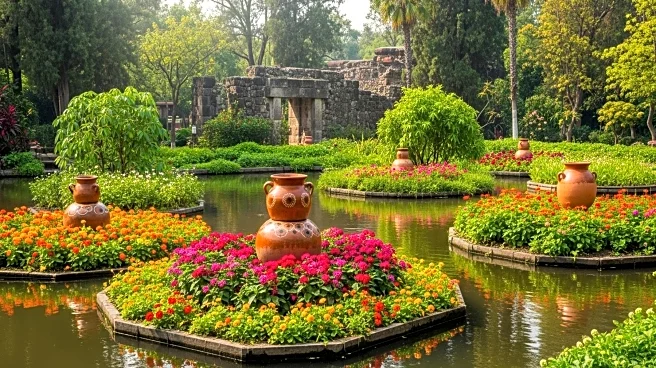What's Happening?
In Mexico City, a group of women is actively working to preserve ancient Aztec chinampas, which are island farms built thousands of years ago. These women, including Jasmín Ordóñez and Cassandra Garduño, have purchased chinampas to cultivate them sustainably, aiming to protect the ecosystem from urban development, mass tourism, and water pollution. Traditionally, chinampas were inherited by men, but these women are challenging gender norms by buying and working the land themselves. The chinampas are recognized by the Food and Agriculture Organization of the United Nations as one of the most productive agricultural systems globally. Efforts include using mud from canal bottoms as fertilizer and collaborating with Mexico's National Autonomous University to promote sustainable practices.
Why It's Important?
The preservation of chinampas is crucial for maintaining the ecological balance in Mexico City. These wetlands are the last remnants of the Aztec Empire's capital, Tenochtitlan, and play a vital role in reducing flooding, storing carbon dioxide, and supporting biodiversity. The initiative by these women not only challenges traditional gender roles but also contributes to environmental conservation. By adopting sustainable farming practices, they help mitigate the impact of urbanization and pollution, which threaten the ecosystem. Their work highlights the importance of community-led conservation efforts in preserving cultural heritage and environmental stability.
What's Next?
The women involved in preserving chinampas are seeking to obtain the 'Etiqueta Chinampera,' a sustainability tag that allows their products to be sold at higher prices. This initiative encourages more farmers, especially women, to adopt sustainable practices. The collaboration with Mexico's National Autonomous University aims to expand these efforts, potentially increasing the number of chinampas dedicated to agriculture rather than tourism. As awareness grows, more women may join the movement, further challenging gender norms and contributing to the conservation of this vital ecosystem.
Beyond the Headlines
The preservation of chinampas by women not only addresses environmental concerns but also represents a shift in cultural and gender dynamics. By reclaiming land traditionally dominated by men, these women are redefining roles within their communities. This movement could inspire similar initiatives globally, where women take active roles in environmental conservation and cultural preservation. The long-term impact may include increased gender equality in agricultural practices and heightened awareness of sustainable farming's role in ecosystem preservation.










